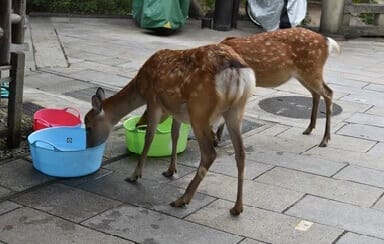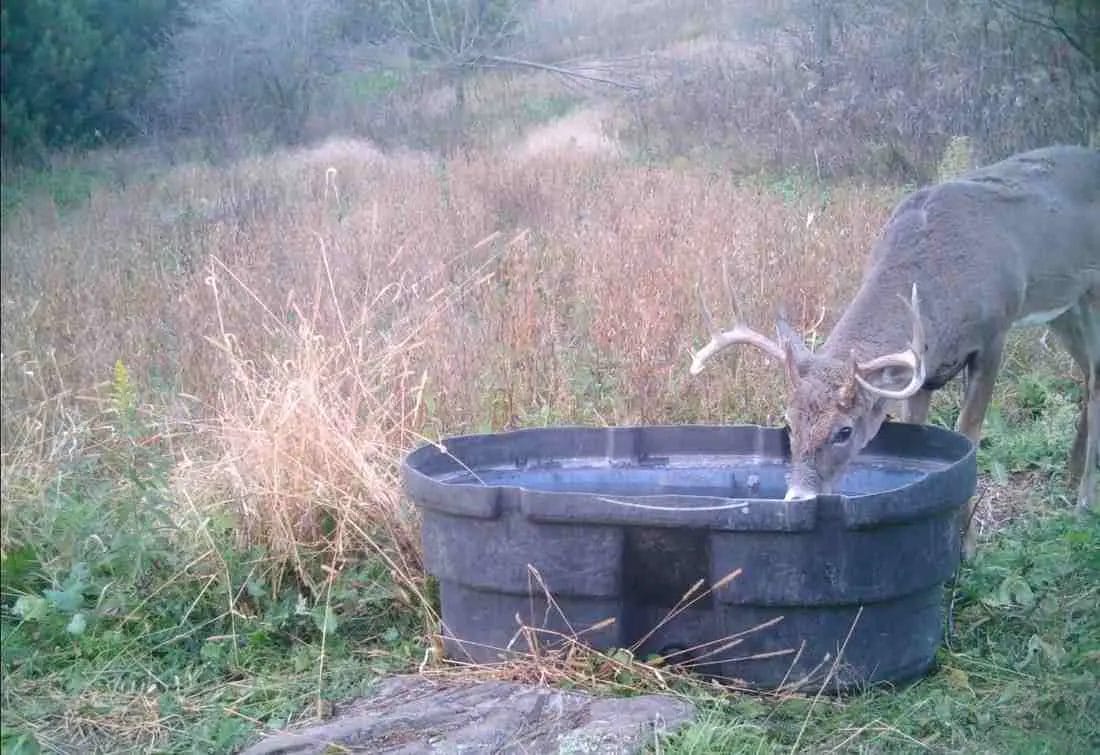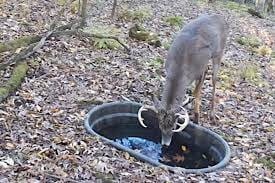Deer are a common sight in many parts of the world, and are known for their graceful and majestic presence in natural habitats. These beautiful creatures have a natural need for water, and it is important for them to have access to a reliable source of hydration in order to survive and thrive.
But what happens when a deer’s natural water sources are scarce or unavailable? Can deer drink from a bucket or other artificial sources of water?

Can Deer Drink from a Bucket?
The short answer is yes, it is possible for deer to drink from a bucket. However, it is important to note that deer are generally hesitant to drink from unfamiliar sources, and may need some encouragement before they are willing to drink from a bucket.
There are also potential risks to consider when providing water for deer in this way. One concern is the possibility of contaminants in the water, as deer are sensitive to certain chemicals and pollutants.
It is important to use a clean and safe source of water, and to regularly clean and maintain the bucket to prevent the build-up of algae or other contaminants.
Another risk to consider is the possibility of injuries to the deer as they attempt to reach the water in the bucket. It is important to place the bucket in a location that is easily accessible to the deer, and to make sure that the bucket is sturdy and secure to prevent accidents.
Factors that May Influence a Deer’s Willingness to Drink from a Bucket
There are several factors that can influence a deer’s willingness to drink from a bucket. One important factor is the presence of natural water sources in the area. If there are plenty of streams, ponds, or other bodies of water available, deer may be less likely to drink from a bucket.
However, if natural sources are scarce or dry, deer may be more willing to drink from an artificial source.
Weather conditions can also play a role in a deer’s need for water. During times of drought or extreme heat, deer may be more desperate for a drink and may be more willing to drink from a bucket.
Attractants can also be used to encourage deer to drink from a bucket. Food, such as apples or carrots, can be placed near the bucket to entice deer to investigate and potentially drink from it. It is important to use caution when using food as an attractant, as overfeeding can lead to negative consequences for the deer and their natural habitat.

Tips for Encouraging Deer to Drink from a Bucket
If you are interested in providing water for deer in your area and are considering using a bucket as a source, there are several things you can do to encourage deer to drink from it.
First and foremost, it is important to properly maintain and clean the bucket. Deer are sensitive to dirty or contaminated water, and may be less likely to drink from a dirty bucket. Make sure to regularly clean the bucket and refill it with fresh, clean water.
Another option is to use a watering system specifically designed for deer. These systems often have features such as automatic refills, filters, and troughs that are more attractive to deer and may be more successful in providing a reliable source of water.
Finally, it is important to consider the location of the bucket when trying to attract deer. Place the bucket in a location that is easily accessible to deer, such as near a natural trail or in a clearing. It may also be helpful to provide some sort of cover or shelter near the bucket to give deer a sense of safety while they drink.

Conclusion
In summary, it is possible for deer to drink from a bucket, but it is important to consider the potential risks and to take steps to make the experience as safe and appealing as possible for the deer. Providing a reliable source of water is crucial for the welfare of deer, and it is important to consider their needs and to follow any local regulations when doing so.
By following these tips and taking the necessary precautions, you can help ensure that deer in your area have access to the hydration they need to survive and thrive.
Frequently Asked Questions
How can I tell if a deer is thirsty?
There are a few signs that you can look for to determine if a deer is thirsty. These include:
- Licking their lips or nose more frequently
- Panting or breathing heavily
- Visibly searching for water sources
- Spending more time in areas with water
How much water do deer need?
The amount of water that a deer needs will depend on a variety of factors, including their size, age, and the weather conditions. In general, deer require about 16-20 ounces of water per day for every 100 pounds of body weight. However, during times of extreme heat or drought, they may need more.
Can I use a bucket to provide water for other wild animals as well?
It is possible to use a bucket to provide water for other wild animals, but it is important to consider the specific needs and preferences of each species. Some animals may be more hesitant to drink from an unfamiliar source, while others may be more attracted to it.
It is also important to consider the potential risks and to take steps to make the water as clean and safe as possible for all animals.
Is it legal to provide water for deer in my area?
The laws surrounding the provision of water for deer will vary depending on your location. In some areas, it is legal to provide water for deer, while in others it may be restricted or prohibited.
It is important to check with your local authorities or wildlife agencies to determine the laws and regulations in your area.
Can I use a bucket to provide water for deer all year round?
It is generally best to provide water for deer on a seasonal basis, rather than all year round. During the winter months, deer can obtain hydration from sources such as snow or ice.
Providing water during the winter may actually be harmful to deer, as it can disrupt their natural behaviors and lead to an over-reliance on artificial sources. If you do choose to provide water for deer during the winter, it is important to make sure the water is clean and unfrozen, and to monitor the situation closely.
